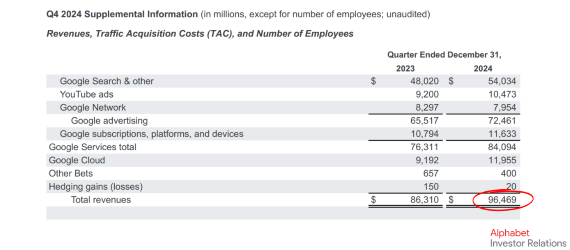
Google’s Momentum in AI and Advertising
Alphabet, Google’s parent company, ended 2024 with another strong quarter, solidifying its leadership in search innovations, digital advertising and AI-powered services. The company reported $96.5 billion in Q4 revenue, reflecting a 12% year-over-year increase.
Advertising remained Alphabet’s primary revenue driver, with Google Search and YouTube continuing to attract steady marketing investments. Despite today’s economic uncertainties, businesses are continuing to prioritize online visibility, fueling Google’s sustained growth.
Beyond advertising, Google’s AI and cloud services are becoming increasingly significant to its revenue mix. As companies embrace automation and data-driven strategies, Alphabet is positioning itself at the forefront of this technologic evolution.

AI Becomes Essential to Business Operations
AI has moved beyond experimentation—it’s now a fundamental part of how businesses operate. Companies are using AI-driven solutions to automate workflows, analyze large datasets, and improve decision-making. This growing reliance on AI has fueled a 30% year-over-year revenue increase for Google Cloud in Q4.
A significant portion of this growth comes from the rising adoption of AI-powered tools like Gemini and Vertex AI. These technologies help businesses optimize operations, enhance customer experiences, and extract insights from vast amounts of data. Industries such as finance and healthcare are rapidly integrating these AI tools into their systems, and Google Cloud has positioned itself as a key provider for enterprises scaling their AI capabilities. With AI’s role in business only expanding, Google Cloud’s growth is set to continue.
Google Expands Global Infrastructure to Meet AI Demand
Supporting AI at scale requires vast computing resources, and Google is making major investments to keep pace. CEO Sundar Pichai announced plans to build 11 new data centers and launch seven subsea cable projects to strengthen the company’s cloud and AI capabilities.
Subsea cables—fiber-optic lines laid along the ocean floor—are essential for global digital communication, enabling high-speed internet and data transfers between continents. By expanding this network, Google is improving connectivity and ensuring businesses have faster, more reliable access to its cloud services.
The new data centers and subsea cables will enhance processing speeds, reduce latency, and increase cloud storage capacity. As AI models demand enormous computing power, these upgrades will allow businesses—including law firms—to utilize AI-driven tools more efficiently and securely.

How Google’s AI and Cloud Expansion Impacts Law Firms
AI and cloud technology are doing much more than just transforming big tech—they’re reshaping entire industries, including the legal sector. As Google enhances its AI capabilities and cloud infrastructure, law firms have the chance to leverage more advanced and efficient tools.
With faster, more reliable cloud services, legal professionals can securely store and access case files, contracts, and client communications from any location. AI-powered research tools can streamline legal analysis, assist in drafting documents, and even provide predictive insights on case outcomes. By automating time-consuming tasks, these technologies enable attorneys to focus on strategy and client service rather than administrative work.
Google Search has notably implemented AI with its AI Overviews. This is a new section of the search engine results page that summarizes information from other websites in plain text. The AI minimizes the time it takes for users to get information by removing the need to click through to websites. This is more user-friendly for people searching for legal information, but it can be harmful to online publishers and websites who are now getting lower click-rates and unable to bring users into their conversion funnels. Law firms depending on organic clicks for client acquisition could see a significant drop in case volume, but those who remain proactive will see this as a SEO opportunity to appear in Google’s AI Overview results to maintain visibility in search.
As AI adoption accelerates, firms that integrate these tools will gain a competitive advantage over those sticking with outdated strategies. From AI-driven legal research and automated document review to enhanced search engine results, Google’s continued investment in AI and cloud computing is helping shape the future of law practice.
The Future of AI in Law: What Firms Need to Know
Google’s latest earnings report sends a clear message—AI isn’t just an emerging technology; it’s a core driver of modern business strategy. With rising demand for AI-powered solutions and major infrastructure investments, Google is doubling down on a future where AI is integral to business operations.
For law firms, AI-driven tools are already enhancing legal research, case management, and case acquisition. As Google continues to refine its AI capabilities and expand cloud infrastructure, firms that adopt these advancements will be better equipped to serve clients efficiently and strategically.
This is where TSEG comes in. As experts in legal marketing for over fifteen years, we help law firms stay ahead by leveraging data-driven strategies and cutting-edge technology to attract and retain clients. The legal industry has historically been slow to embrace innovation, but that’s changing. TSEG is here to guide your firm through this transition, ensuring you maximize the latest advancements to grow your practice. Visit tseg.com to learn more, or email us your questions at inquiry@tseg.com.
